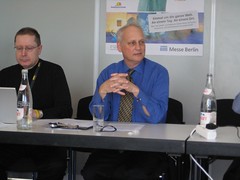» Next Entries
March 2008
The Archives
-
Internet, Travel & Tourism
Phocuswright Travel Bloggers Summit: Introduction by Philip Wolf, CEO of Phocuswright
03.05.08 | Permalink | 4 Comments
It’s always great to get confirmation about what I believe the future of travel is going to be. Philip has been a leader in identifying trends that will impact travel in the future. He spoke about the resistance of companies and preserving business models. “Winners focus on customer preservation, not business model preservation.” was a quote that resonated with me.
During Travel 1.0, travel distribution moved online. Traditional companies resisted this change because it impacted their business model. As a result, virtually none of the traditional brands became online travel leaders.
Now in Travel 2.0, social media, web services and the resulting long tail opportunities are impacting the online travel space. And again, companies are resisting this change. But now even travel 1.0 companies (online travel agencies) are trying to preserve their commission based business model. They initially rejected meta search for example, and companies like Kayak are becoming the next leaders in the travel space.
So what’s the future for distribution? According to Philip. Pay-per-Click (PPC) and Pay-per-Action (PPA) models are changing. Expedia’s agreement with IHG to move to a PPC model is a clear indicator.
I agree. The distribution is going to be dominated by the supplier because they want to control the transaction. They are interested in qualified leads and will pay websites that deliver the most qualified leads that drive transactions. Instead of paying a commission, they will pay for the lead and monitor the cost per transaction. As soon as this drives enough business, they will abandon commission based distributors. -
Internet, personal
Bloggers vs. Journalists
03.02.08 | Permalink | 2 CommentsThe subject of this post is the panel I will be participating in during the workshop at the Phocuswright bloggers summit in Berlin on Wednesday. I don’t think it’s an us vs. them at all. There’s a place for both.
Journalism is turning data into knowledge. A journalist has the tools and skills to gather all information (the data), get to the core and communicate his/her conclusion. I always learn a lot from traditional media when I don’t know too much about something.
The bloggers I like either give me their knowledge, their opinion, or data I can use to gain knowledge. Often the value is the conversational aspect. Even though they might not posses the communication skills a journalist possesses, their subject matter expertise compensates for it.
I’ve been on similar panels before and the editorial argument often comes up. This is interesting because it touches upon the editorial team vs. the wisdom of crowds. And both work, for different purposes. I trust the BCC or NY Times to tell me the most important news. I trust Digg or Techmeme to let me know what’s most popular or what’s discussed the most.
Times have changed, and will continue to change. The key is to embrace change find your new role, models to operate under and the opportunities that comes with it.
I look forward to the discussion on Wednesday, and I hope to see you there.
» Next Entries

